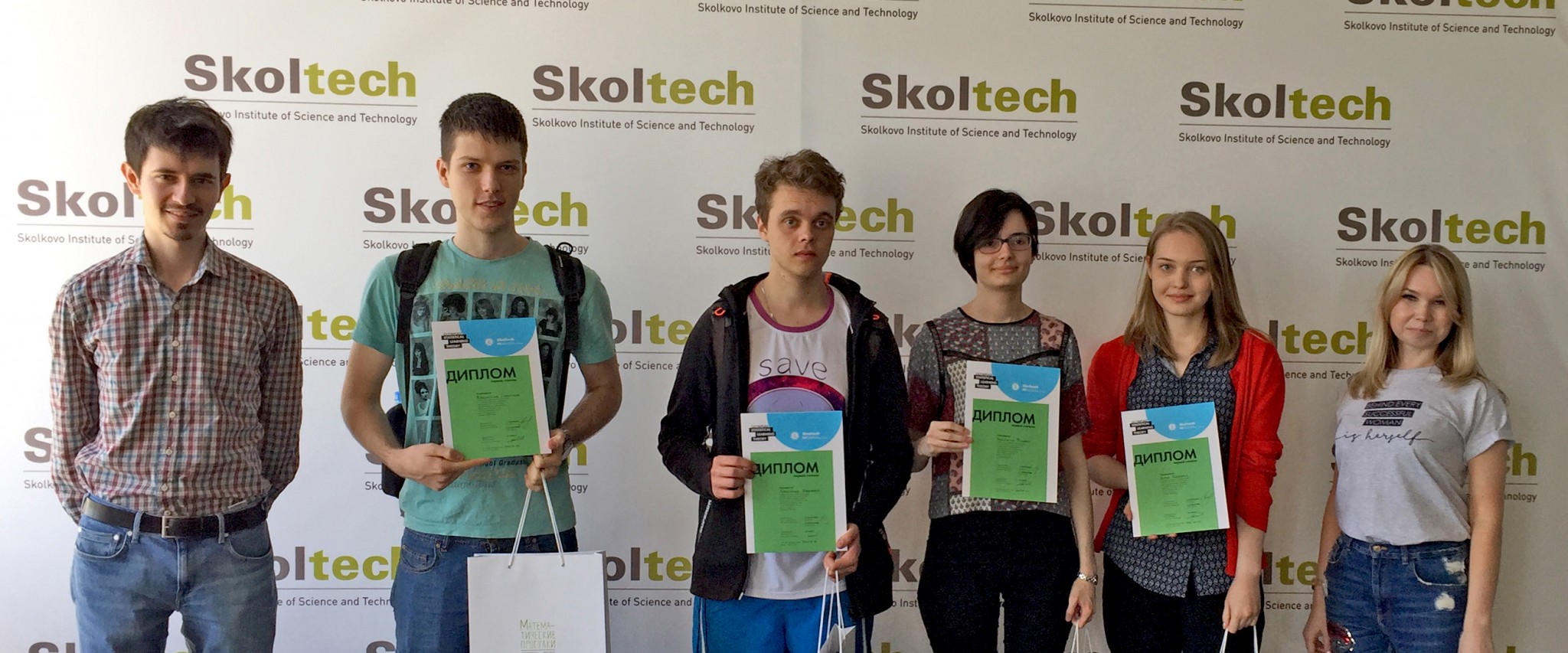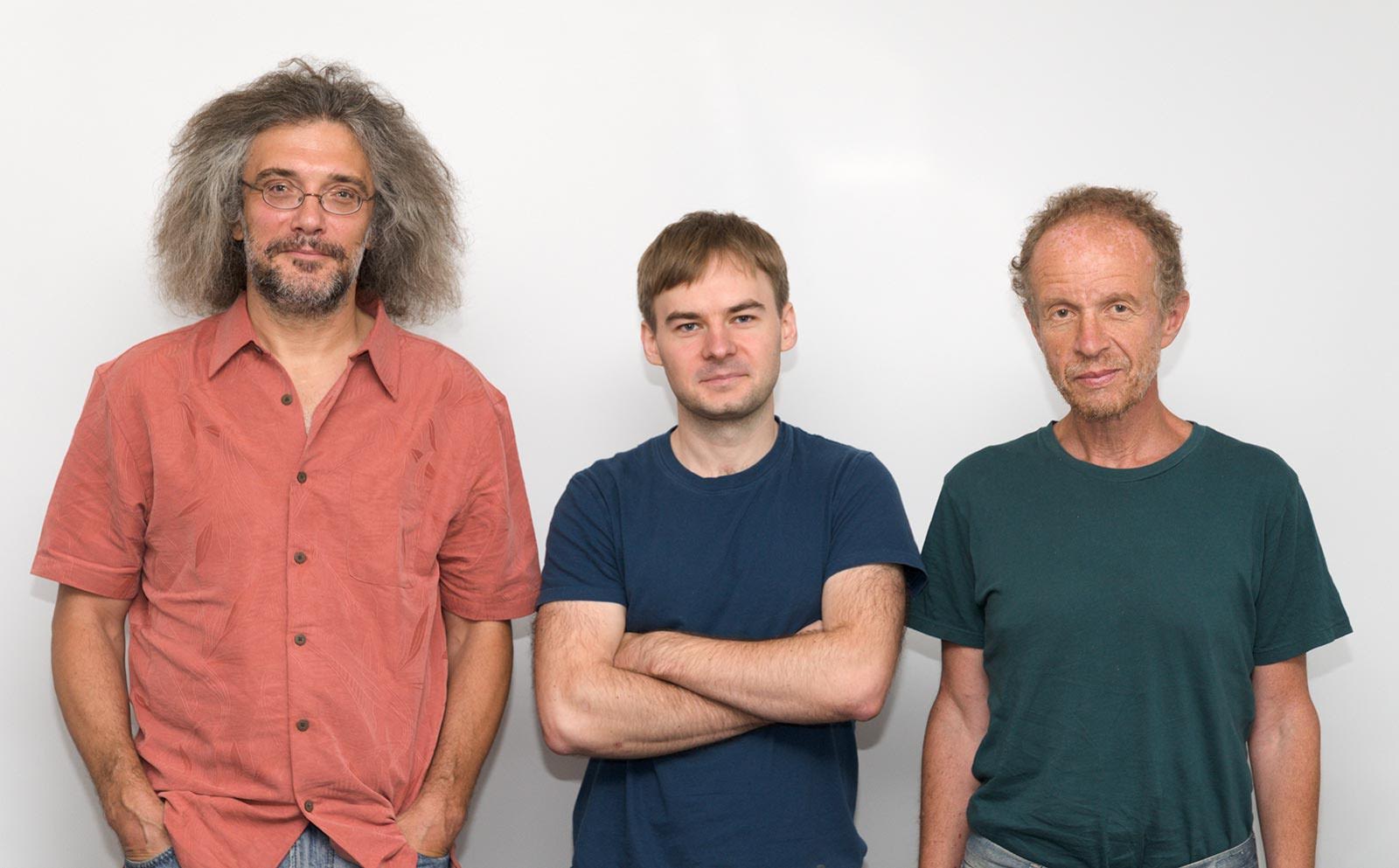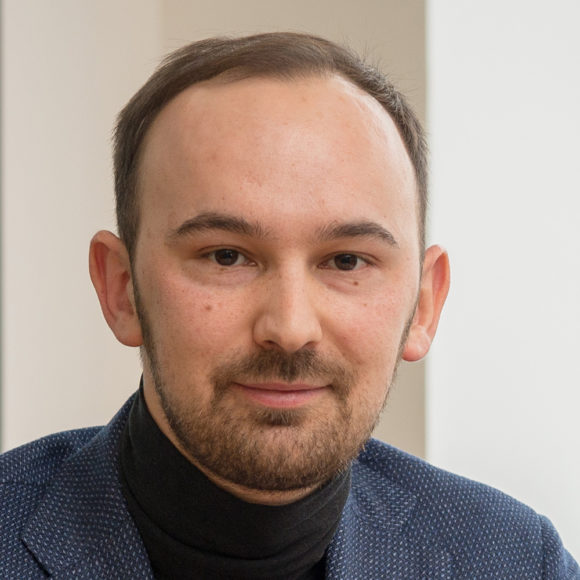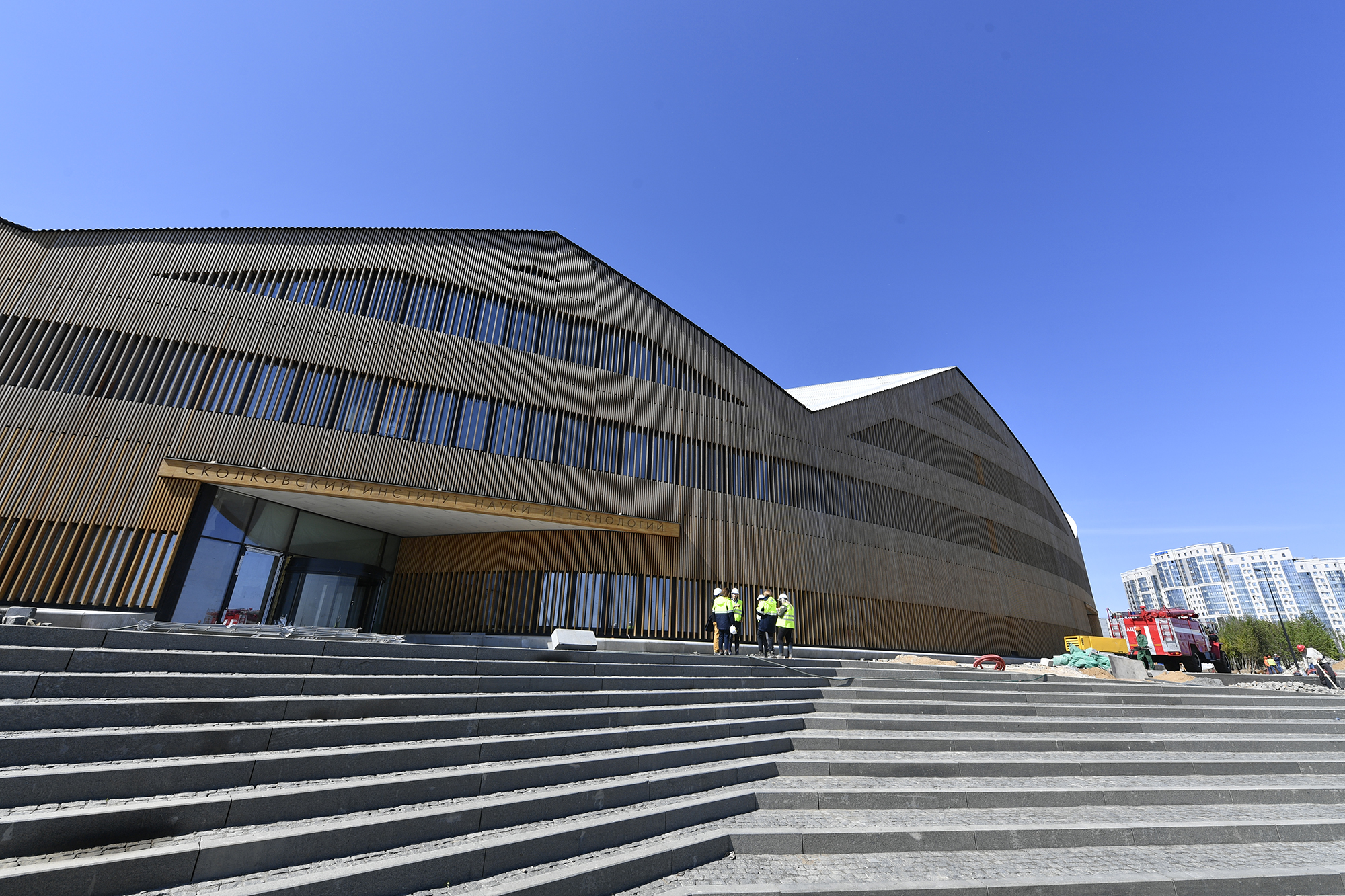In his interview with Troitsky Variant ‒ Science, Alexander Safonov, Vice President for Development at Skoltech, offered insights into why students from all over the world come to study at the institute, how it has picked up the baton from the Dynasty Foundation and what kind of music it is associated with.
Alexander Safonov graduated with honors from the Moscow Institute of Physics and Technology (MIPT) in 2006 and earned a PhD degree in Telecommunication Networks and Systems in 2008.
While still an MIPT MSc student, he joined the Institute for Information Transmission Problems (IITP RAS) where he contributed to the development of the IEEE 802.11 (Wi-Fi) communication standards by presenting the achievements of one of IITP labs to the IEEE 802 Local Area Network (LAN) / Metropolitan Area Network (MAN) Standardization Committee. Alexander is the author of over 40 scientific works and international patents.
— Do you regret that universities like Skoltech did not exist when you were a student?
— If I were a student now, I would certainly try to enroll at Skoltech, but at the time my English wasn’t good enough. To become a Skoltech student, you must pass the TOEFL exam and attend classes in English. It was only at MIPT that I started studying English in earnest.
— Is teaching in English the only unique feature of Skoltech? How does the admission process work and how tough is it for candidates?
— Regarding the selection process, Skoltech differs a lot from other Russian universities, where MSc applicants [often] hold a bachelor’s degree from the same university. Skoltech does not have its own bachelor’s program yet, so it has to recruit MSc students from all over Russia and the world.
The admission campaign is built around the “applying by doing” principle. Getting as far as the interview stage takes some effort: a candidate must fill out a rather complicated questionnaire in English, attaching a motivation letter and two letters of reference from recognized experts in the field. One letter can be provided by the candidate’s former supervisor. As for the other letter, the applicant should go to some length to find a suitable expert willing to give a reference. Finally, all the candidates have to pass a complicated online test that lasts several hours.
Here at Skoltech, we hold Selection Weekends where pre-selected candidates sit for the TOEFL exam and a tough exam in Mathematics.
The next exciting step is the interview. Applicants for the Biotechnology program are interviewed by a panel of ten professors and are provided with a collection of recent papers by the interviewing professors well before the interview. An applicant should choose the paper they find most interesting and study it thoroughly to be prepared for discussion at an expert level. The candidates should in fact conduct a mini-study before they show up for the interview which lasts about 30 minutes.
Skoltech offers 10 MSc and 7 PhD programs, each of which provides additional admissions opportunities. For example, to be admitted to the Computational Science and Engineering program this year, an applicant must pass a test on N + 1 web portal and earn additional scores. To join this year’s Data Science program, one could have participated in the joint Olympiad with the Higher School of Economics (HSE), which ended two weeks ago.

Winners of the Skoltech and HSE joint Olympiad on Statistical Theory of Learning pictured at the diploma award ceremony. Photo: Skoltech.
Applicants hail from all over Russia ‒ from Vladivostok to Kaliningrad. Notably, they take care of all their travel and accommodation expenses and do not get any reimbursement from Skoltech. All of them are highly motivated and eager for a challenge, to pass the exams and assume responsibility for their future life and career.
— Do you have tough competition?
— Last year we got upwards of 11,000 applications.
— What is your target for this year?
— We plan to recruit 320 MSc students and, like last year, slightly more than 100 PhD students. In the United States and Europe, young people choose where to study well in advance, whereas in Russia the admission campaign is in full swing right now.
- Data Science
- Computational Science and Engineering
- Biotechnology
- Space and Engineering Systems
- Advanced and Digital Engineering Technologies
- Materials Science
- Energy Systems
- Petroleum Engineering
- Photonics and Quantum Materials
- Mathematical and Theoretical Physics
- Computational and Data Science and Engineering
- Life Sciences
- Materials Science and Engineering
- Petroleum Engineering
- Engineering Systems
- Physics
- Petroleum Engineering
— Are you still in the process of growing?
— We are expanding in accordance with our growth plan. We intend to engage more faculty and expand the infrastructure. The campus we occupy now has become too small for Skoltech. We use our classroom space to the full extent and it doesn’t seem enough…
— Does your campus consist of one or several buildings?
— A year ago we had a single building where we still have our main facilities, but since then we have had to rent more space for labs and classrooms in the two neighboring buildings. Our flagship course ‒ the Innovation Workshop ‒ takes place in the Skolkovo Technopark, because here we don’t have enough space to accommodate all the students.
— What is the Innovation Workshop?
— The Innovation Workshop is the first immersion course taken by all Skoltech students. This is an all-day event, held every day for a month, so there are no other courses for students during this time. At Innovation Workshop, the students get to know each other, learn about the capabilities of the innovation ecosystem and the support they can get for translating their research findings into practical applications, and get a chance to work on specific projects within interdisciplinary teams. This course is conducted by mentors, who provide training in both hard and soft skills.
The Innovation Workshop is the first but not the only innovation component of our educational programs, where students acquire valuable skills that will help them to build interdisciplinary teams for their own projects and commercialize their future research results.
The Innovation Workshop is attended by all Skoltech students, no matter their area of specialization: photonics, bioinformatics, engineering, theoretical physics and beyond. The hallmark of all Skoltech programs, immersion is also practiced in partner programs that Skoltech cooperates with, including MIPT, HSE, Far Eastern Federal University (FEFU) and Kazan Federal University (KFU).
In 2017, the course attracted newly recruited students and over 40 mentors, and resulted in 47 student projects. Just imagine the magnitude of the event. We definitely need a new campus.
— Will the new campus be inaugurated this year?
— We very much hope it will. Work is under way to equip the classrooms and labs. The campus changes its appearance with each passing month. I went there recently and watched small trucks deliver sand for anti-vibration cushions for the scanning electron microscope. This will be a unique installation for Russia. Some other facilities, for example, the clean room, will be finished next year.
— Will there be enough space for the students to study and live in the new building?
— The campus will comprise labs and classrooms but no living space, although many labs will operate on a 24/7 basis. As for a student dormitory, the issue has already been raised at a meeting of the Board of Trustees and I believe it will be successfully resolved.
— It would be good to help students to get accustomed to living in Moscow, at least in the first several months… Coming here on a bus, I heard Skoltech students mention that six of them rent a three-bedroom apartment near Kropotkinskaya metro.
— Not only do Skoltech students get a quality education, they enjoy being on the move, undauntedly take risks and dealing with daily-life issues. Skoltech’s Student Life office and the student community are really helpful in resolving student housing problems. New students also get useful tips from students who have already been at Skoltech for a while through social networks.
— Is the Skoltech stipend big enough for students to focus on their studies and not worry about making a living?
— Skoltech students get a decent stipend and can afford to rent a place to live, even if it means sharing a place with their fellow students. With a wide choice of amenities on the campus, such as a canteen, a gym, a promenade area, and a library with all the relevant journal and database subscriptions, the students and postdocs can fully focus on their studies and research.
— Is there an age limit for admission? Would you admit an elderly candidate who suddenly decides to change their life?
— There is no age limit, although we’ve had no cases of this kind yet. However, applicants who have already completed a specialty training course or earned a master’s degree elsewhere often apply for Skoltech’s MSc programs as they are generally of very high quality and offer truly unique courses.
Our educational portfolio is thoroughly updated and expanded every year. This year we offer 170 disciplines ‒ and this despite the fact that Skoltech has only 700 students. This helps students and their supervisors to flexibly trace the educational pathways.
— What’s the ratio of compulsory and optional disciplines?
— Most of the courses are elective. Each program includes a few compulsory courses on the core specialty and other compulsory elements such as research and industrial immersion.
Students come from very different universities and often change their specialization once they join Skoltech. For example, some of our Biotechnology program applicants are graduates of HSE or Bauman Moscow State Technical University (MSTU), which offer a different basic education in fields totally unrelated to Biology. To level out the difference, we teach a course in Molecular Biology.
Almost all the students attend a basic course in Data Science, which covers classical mathematical problems. This part of the training is important because once they come across a specific task in the future, they should not try to re-invent the wheel; rather, they should check if somebody else has encountered the same problem and ask mathematicians for help. That’s how interdisciplinary teams are built.
— In what cases would you select non-biologists for the Biotechnology program?
— The choice is made by the professors who are guided primarily by the candidate’s motivation and engage students from related fields in major interdisciplinary tasks.
— Where do your applicants come from?
— According to the 2017 admission campaign results, 20% were international students from 35 countries, including Canada, Brazil, Germany, the CIS, Iran, India, China and other countries.
— Why would young people from America or Europe choose Skoltech?
— I’ve been wondering about that too. I always read their motivation letters and I get the feeling that they choose Skoltech because we have world-class faculty, strongly support academic mobility and teach in English only. Names like [Igor] Krichever and [Sergei] Lando speak volumes. The Data Science program, developed by [Maxim] Fedorov and [Vladimir] Spokoiny jointly with HSE is as good as Stanford’s Data Science program, which experts believe to be the best in the world.
The Biotechnology program created by [Konstantin] Severinov and [Mikhail] Gelfand gives the students a chance to conduct research in hot areas such as CRISPR and do their internships with the world-leading labs, such as those directed by Feng Zhang and Emmanuelle Charpentier, who are probably future Nobel Prize contenders.
Beyond that, some foreign students mention that they studied Russian literature as a minor and were enthralled with the opportunity to travel to Russia and study at an international university there.
Developing Skoltech
— How many classes of MSc and PhD graduates have you had?
— We’ve had three classes of MSc graduates and a class of eight PhD graduates last year. I’d like to note that all the PhD graduates successfully defended their PhD theses before an international jury of high-ranking experts and met all the Skoltech PhD defense requirements, which are much more stringent as compared to the standard VAC (Russian State Commission for Academic Degrees and Titles) defense rules. Although Skoltech is still a very young university and its PhD degree is not yet widely recognized, we can vouch for the quality of our PhD students.
For example, Sergei Shmakov, a “non-biologist” and an MSTU graduate who enrolled in the Biotechnology program, won the NIH Director’s Award in 2016 for his CRISPR-Cas research as a member of Professor Konstantin Severinov’s team. The results of the study were published in Nature, with Sergey Shmakov mentioned as the first author, which is important for biology papers.

Sergey Shmakov (center) and his supervisors Konstantin Severinov (left) and Evgeny Kunin (right). Photo: Skoltech.
— Do you follow your graduates’ career paths?
— About one third of our MSc graduates have stayed at Skoltech to continue as PhD students, while another 14% went on to obtain PhD degrees from the best universities abroad, about 10% created their own or joined existing start-ups, 20% landed jobs with leading Russian tech companies, such as Yandex, IPG Photonics, Sbertech and Visillect, about 9% took jobs with Russian research labs and about 10% took jobs with industrial companies and labs abroad.
— What’s the outlook for Skoltech for the next five years?
— Skoltech will carry on as an international university, focusing on six target domains. Once we move to the new campus and settle down, we’ll create best-in-class labs and shared facilities and have twice as many faculty and students.
As regards the education, to evolve into a full-fledged university, Skoltech will launch bachelor’s programs. Right now we are actively discussing this issue. A lot of decisions need to be made, such as the choice of the field of knowledge in the first place.
Opinions are divided on this point: some believe we should have a bachelor’s program in Physics, claiming that physicists are easily “convertible” into experts in related specialties. Others argue it should be Data Science ‒ the pillar of the digital economy. Still others who are more into functional materials have their own view on the matter.
I guess Skoltech will start with what some international universities call an undergraduate research opportunities initiative. It will allow students from partner universities to perform their undergraduate projects and attend advanced courses at Skoltech. This will be the first step towards attracting prospective bachelor students and launching the first bachelor’s program.
— Do you expect Skoltech to appear in international rankings?
— As regards our positioning in the global landscape, we take an active part in international competitions. For example, a couple weeks ago researchers from our Robotics Lab won the fifth place in Eurobot-2018 ‒ a major European robotics competition. Before that, they had won the Russian round for three years in a row and now they come fifth in the European final, so they are no longer a bush league team, so to speak.
If you are referring to Times Higher Education and QS World University Rankings mentioned in the Project 5-100 program, a bachelor’s program is a must for a university to be included in the rankings. With most indicators calculated on the “per faculty member” basis, Skoltech has an objective advantage as long as it doesn’t have a bachelor’s program.
In due course Skoltech will launch a bachelor’s program and will certainly be included in all the international rankings. In the meantime, we’ll stay small and use this to our advantage, while remaining dynamic and flexible.
— Do you experience any bureaucratic restrictions or are you totally free to do what you like?
— Formally, we are an autonomous non-profit organization, but like any other institution, we operate in the Russian legislative framework, and our educational programs are accredited by the state. But again, our programs are highly flexible and constantly updated jointly with our industrial partners.
— Do your new programs run into internal bureaucratic obstacles?
— There can be a bit of bureaucracy everywhere, but we are able to respond quickly to our faculty’s proposals and enhance our programs with new courses and practices.
Skoltech cooperates with upwards of 150 academic partners around the world and over 350 Russian and international industrial partners.Opening up Skoltech
— Skoltech is synonymous with continuous growth. How would you define your mission as Vice President for Development?
— My mission is to serve the cause of developing Skoltech and open it up for Russia and the world.
— Clearly, Skoltech is after engaging talented graduates from leading universities, for example, HSE. But what does HSE get from Skoltech in exchange and isn’t it afraid of losing its best students?
— We are after cooperation and not competition. For example, we are trying to set up network educational programs. A Skoltech student can simultaneously be a HSE or MIPT student, have two co-supervisors, prepare a thesis complying with both universities’ requirements, defend it in English and eventually receive two diplomas.
— What’s most difficult in developing Skoltech?
— Ensuring steady growth and maintaining a high educational standard at the same time.
In 2017, Skoltech enrolled a total of 86 students from 29 countries, over half of them graduates of Top 300 universities according to QS or THE ranking.Brain drain is another nuisance. We cannot yet win over the students who are invited by MIT or Stanford… We have to work hard so that the students return to Skoltech as postdocs after earning their PhD degrees elsewhere. We are doing our best to make it happen.
— Does the situation in the country affect Skoltech?
— Of course it does, because we are part of the country. For example, attracting faculty from the international market is getting more difficult. Nevertheless, over the last year about 300 Skoltech students have completed internships at leading international labs. In this sense, things are not getting worse. It’s the high quality of students and not politics that the academic world is interested in, so luckily our students are still welcome to complete internship in other countries.
— Do you rely more on the Russian or international labor market?
— Skoltech aims to attract professionals with years’ of experience in leading international research centers. This helps bring in competencies that still lack in Russia, adopt the best research practices and develop a partner network.
We are also working on a series of projects to support young talents in Russia. For the last two years, we have acted as co-organizers of the “Young Russian Mathematics” competition.
— Is this the project you took over from the Dynasty Foundation and Pierre Deligne?
— Yes, this is an impressive project which is highly important to us.
— What about your own scientific research? Do you have time for that?
— I admit that I hardly have time for research, though my senior colleagues keep telling me that I’ll lose my touch if I don’t do anything about it. I realize I need to put more effort into it and this year I expect to spend more time on research than last year.
— And here is my last question. If you were to compare Skoltech to music, what style would it be? Rock? Jazz?
— Bob Dylan’s music. And we expect to win a Nobel Prize too.
— Thank you for the interview.
Founded in 2011 in collaboration with the Massachusetts Institute of Technology (MIT), Skoltech has 104 professors, 200 researchers and postdocs, and 700 students. In 2017, over 500 publications by Skoltech authors were indexed in Web of Science or Sсopus.Source: Troitsky Variant – Science


